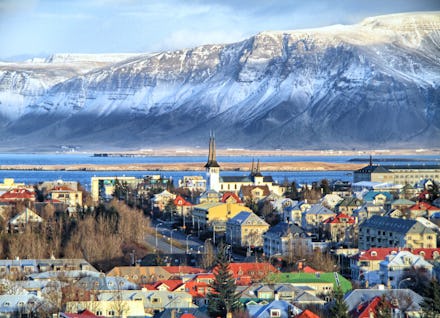How Iceland Became the Most Feminist Country in the World

No country has achieved gender equality yet — but Iceland is the country that has come the closest.
For the fifth consecutive year, Iceland has held the top spot in prioritizing equality and removing the obstacles that hold women back, according to the World Economic Forum's Global Gender Gap Report 2013, which measures gender parity in 136 countries.
Despite the fact that Iceland, like many other Nordic countries, are high-income economies, the report strips out overall wealth, and instead, focuses on economic participation and opportunity, educational attainment, health and survival, and political empowerment among men and women.
Image Credit: World Economic Forum
While most countries were still reeling from the economic crisis in 2008, this Nordic nation managed to pick itself up and propel it to new economic heights by focusing on closing the gender gap. In October 2008, Iceland's financial system collapsed under the weight of debt, which led to rising unemployment, a severe currency crisis and a series of protests and demonstrations that forced the conservative government to resign.
A new, progressive government under the leadership of Social Democrat Jóhanna Sigurdardóttir, the world's first openly gay prime minister, took over the Nordic nation.
Unlike the United States, Iceland took a much more muscular approach in dealing with the crisis, and women were at the forefront of the national economic clean-up. The tiny nation's new government assembled a sweeping investigation into the entities that contributed to the global financial crisis, prosecuting those responsible, including its former prime minister, Geir H. Haarde. They also worked to hold banks accountable, cut government spending, raised taxes and created a comprehensive debt-relief program that, in some cases, even forgave individual household debts completely.
Image Credit: AP. Jóhanna Sigurdardóttir, who was Iceland's Prime Minister from 2009- 2013.
The country also came to the radical conclusion that its male-dominated economy, banking system and business culture were responsible for the mess. Arguing that the crisis created an opportunity for women, they decided to lead the way, step into the positions vacated by men and help create a more balanced economy "bringing female values into the mainly male spheres of private equity, wealth management and corporate advice."
Halla Tómasdóttir, cofounder of Audur Capital and former managing director of the Iceland Chamber of Commerce, said the crisis was "man-made" and compared it to a "penis competition" based on short-term maximization of profits, short-lived market prices and lucrative bonuses without any regard for losses.
Throughout Iceland's peaceful revolution, the new government also prioritized gender equality becoming a model for other countries.
Having approved equal inheritance rights for men and women in 1850 and female suffrage as early as 1915, Iceland has always been a global leader in gender equality and the political, economic and social empowerment of women. And they haven't stopped there.
In Iceland, there are over 1.5 women for every man enrolled in university.
Iceland, like many other Nordic countries, has continued to seek ways to maximize returns on their investment by creating laws and opportunities for both sexes to rise to positions of leadership, boost higher rates of development and become more economically competitive, therefore narrowing the gender gap.
In 2000, Iceland passed a law that granted three months of non-transferable parental leave to both mothers and fathers with an additional three months of leave for the couple to share as they chose. In 2010, the country passed a new law that obligates companies to have minimum 40% women or men on their boards. Iceland is also ranked in the top 10 countries for the number of women in parliament, percentage of women in ministerial-level positions and the number of years with a female head of state or government.
Both developed and developing countries have much to learn from this "Nordic Nirvana" that reminds us that gender equality is more than just a matter of "equal rights." It is a matter of efficiency in moving toward closing the gender gap where both men and women share power and influence in a country's development and progress.